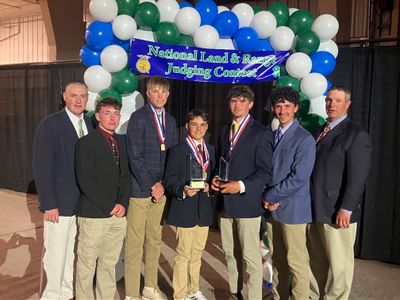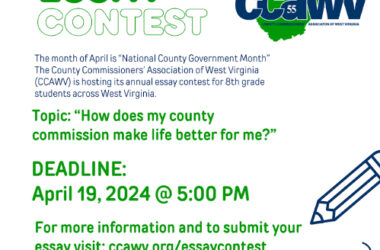WV Press Release Sharing
MORGANTOWN, W.Va. — West Virginia University Extension 4-H teams have a long history of earning top honors in the national land judging and homesite evaluation competitions. In May, a team of Monroe County youths continued that legacy by winning the national champion title at the National Land Judging and Homesite Evaluation Contest in Oklahoma.
Michael Fraley, Luke Fraley, Thomas Sibold, Caleb Broyles and Peyton Gardinier practiced for nearly a year to bring home the first place title in the land judging competition. The team was coached by Brian Wickline – an alum of Monroe County FFA with a second place land judging title of his own at the national competition. Luke Fraley earned the second highest individual score for homesite evaluation and Sibold earned third place in individual scoring for land judging.
Land judging and homesite evaluation programs educate youth about soil properties, and in West Virginia, these practices are used when constructing buildings or homes and for agriculture practices.
These practices are more than evaluating soil textures, composition, permeability, erosion characteristics and the slope of the land; for many youths, it teaches practical soil lessons for land use, and for some, it sparks a lifelong interest.
The team started preparing for the competition in January and picked up the number of hours they practiced as the competition got closer. Prior to the competition the team spent a week in Oklahoma practicing on-site to adjust to the variety of soils they would judge.
“The soils and slopes in Oklahoma are very different compared to West Virginia. They have more soil variations and less slope than we have in West Virginia, so the kids must relearn everything,” Brian Wickline, WVU Extension agent in Monroe County, said. “It is a good educational process for them because they get to see different soil variations, such as sand and clay.”
Team members are only allowed a pencil, scorecard and knife, with the goal of assigning a land class and dictating how the land will be used for agriculture, forestry or home use. Land judging and homesite evaluation provide practical knowledge, as well as being a resume builder and can lead to careers in agriculture and construction.
“It was great seeing my team succeed at the competition. When you give them an opportunity to succeed, it will spark an interest in them,” Wickline said. “Many of the 4-H’ers who have participated in land judging and homesite evaluation have gone on to pursue careers in agriculture science.”
Over 700 participants from 35 states participated in the competition, including eight 4-H and FFA teams from West Virginia. In addition to Monroe County, teams from Barbour and Jefferson counties placed in the top 15 for 4-H land judging, and Barbour County even secured a third place spot in land judging and a fifth place spot in 4-H homesite evaluation. Each of the West Virginia 4-H teams, plus the Clay County FFA team, were coached by WVU Extension faculty who also were once participants themselves.
“Land judging is a great opportunity for these kids to try something new and step outside of their comfort zone, and making it to the national competition is a feat itself,” Emily Morrow, WVU Extension agent in Jefferson County and Jefferson County 4-H coach, said. “The kids put in a lot of work, and they were thrilled to have the opportunity to make it to the national competition since West Virginia has a reputation of working hard and doing well in Oklahoma. All the experiences that come with participating in this competition are really valuable.”
Morrow competed on a team in Tyler County as an FFA member and won both national competitions that she competed in as well as placing as an individual. Morrow’s interest in land judging led her to join the WVU Soil Judging Team. Her interest in soil science turned into a career as an Extension agent and has allowed her to be a coach since 2019.
Nationally, West Virginia is not an underdog at the competition, and we are respected for the time, effort and success we have had over the years, Wickline added.
“It is great that we placed as well as we did, but it is the memories and experiences that those kids get that they may not have elsewhere,” Michael Shamblin, WVU Extension agent in Clay County and Clay County FFA coach, said. “I am very excited and so happy the team did well, and we had a tremendous time doing it and that is what matters. It is not all about digging holes and shooting slopes, having an adult encouraging them, teaching them to work hard and accomplishing a goal, and in this case being successful, is what it is about.”
This year, the Clay County FFA team tied for first in land judging and third in homesite evaluation. As a teenager, Shamblin also competed on a team for Roane County and placed at the national competition. He has been coaching the Clay County FFA team since 2003.
In addition to teaching science and math skills, land judging and homesite evaluation teaches participants logical reasoning skills, how to work hard and how to work together as a team.
“Being on a team was one of the most rewarding opportunities that I took advantage of in 4-H. It was something that allowed me to put my foot in the door for a future career,” Jody Carpenter, WVU Extension agent and coach in Barbour County, said. “Essentially, these kids are soil scientists; they do everything a soil scientist does to evaluate the land. I thought it was pretty cool being on a team and going to nationals, and I think the kids on the team now think so, too.”
Carpenter competed on a team for Barbour County and won the national competition in 2010. Barbour County is the longest lasting county in the state to go to nationals in the last 63 years. Carpenter has been a coach for the 4-H team since 2013.
“Competing at the national competition was a once in a lifetime opportunity to truly appreciate one of the most forgotten resources, soil,” Michael Fraley said. “We were able to meet students from across the nation and witness agricultural practices that were very different from what we see back home. It was a great experience seeing the 4-H and FFA teams from West Virginia place in their respective competitions. Hearing that chatter among the crowd of the West Virginia teams made me proud to be a Mountaineer.”
From 1959 to 2023, West Virginia 4-H and FFA teams have won more than 40 national championships. Just two months after the national competition, a new group of 4-H’ers will participate in the 2023 State 4-H Land Judging and Homesite Evaluation Contest on July 13 in hopes to qualify for the 2024 national competition.
To learn more about opportunities in the 4-H program, visit extension.wvu.edu, or contact your local office of WVU Extension.
-WVU-
sd/06/30/23
CONTACT: Sophia Darmelio
WVU Extension
Marketing Strategist
304-293-9490; [email protected]




